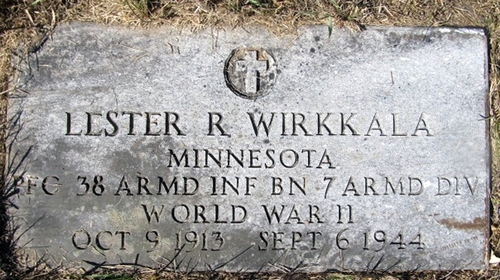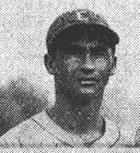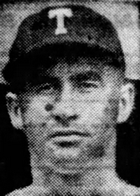Les Wirkkala
| Date and Place of Birth: | October 9, 1913 Sebeka, MN |
| Date and Place of Death: | September 7, 1944 Gravelotte, France |
| Baseball Experience: | Minor League |
| Position: | Pitcher |
| Rank: | Private First Class |
| Military Unit: | Company B, 38th Armored Infantry Battalion, 7th Armored Division US Army |
| Area Served: | European Theater of Operations |
Wirkkala was one of the most popular players to ever don a Fremont uniform. But his hopes to play in the major leagues would end on the battlefields of France.
Lester R. Wirkkala, the son of Juho and Elisabeth Wirkkala, grew up in Sebeka, a small town in the primarily
agricultural area of central Minnesota. A celebrated player during his
school days at Sebeka High School, Wirkkala pitched for the Sebeka
Stingers in 1932, the league champions in the amateur OTW (Ottertail,
Todd and Wadena counties) League, and runners-up in the state Class B
tournament.
Wirkkala began his professional baseball career in 1935, when he signed
with the nearby Brainerd Blues of the Class D Northern League. He
pitched just four games for the Blues for an 0-1 record before being
sent home. But Wirkkala was back in the Northern League in 1936, signing
with the Wausau Timberjacks. He made 18 appearances for a 2-4 record,
and a further 16 appearances for a 1-4 record in 1937. In 1938, he
joined the Beatrice Blues of the Class D Nebraska State League, where he
was 2-5 in eight appearances, and joined the Fremont Green Sox of the
Class D Ohio State League following the disbandment of the Nebraska
circuit in July.
With Fremont in 1939, Wirkkala began to show his ability on the mound
and helped the team to the league pennant. In leading the Green Sox
pitching staff, he completed 22 of 23 starts for a 14-9 record and
struck out 190 batters in 198 innings. A league allstar, he was a big
success with the local fans, who nicknamed him the "Silent Finn" for his
placidity, and the Fremont News-Messenger labeled him "one of the best
right-handers to pitch with Fremont."[1] His contract was purchased by
the St. Louis Browns at the end of the season and the 25-year-old made
the jump from Class D to Class AA when he made an end-of-season
appearance with the Toledo Mud Hens of the American Association, hurling
five innings for a win. "That kid's got what it takes," said Mud Hens
manager Zack Taylor. "Most pitchers get cold chills running up and down
their throwing arm when things begin to get complicated. Wirkkala isn't
that kind of a thrower. The tougher the situation, the calmer he gets.
Whatever other Association pitchers have on him in the way of stuff, he
makes up with real courage and poise." [2]
Wirkkala pitched well during spring training with the Mud Hens in 1940,
and secured a spot on the pitching staff after an early season 3-2 win
over the Milwaukee Brewers. He became a real workhorse for the Mud Hens
over the next two seasons, making 39 appearances (24 starts) in 1940 for
a 9-13 record and 4.82 ERA, and adding 37 appearances (20 starts) for a
12-10 record and 4.06 ERA in 1941.
At the close of the season, Wirkkala secured a job helping to build
the reception center at Camp Perry, the U.S. Army's training camp at
Lake Erie, Ohio. [3] He was due to report to the St.
Louis Browns' spring training camp for 1942, but was inducted for
military service on February 5, ironically, at Camp Perry. Wirkkala trained at Camp Polk, Louisiana, with
the 38th Armored Infantry Battalion of the 7th Armored Division. In
March 1943, the division moved to the Desert Training Center in
California, for five months of training and maneuvers. It was assigned
to Fort Benning, Georgia, in August 1943, and left for England in June
1944.
In August 1944, the 7th Armored Division arrived in Normandy and made an
offensive sweep across France during which it helped liberate such
cities as Chartres, ChateauThierry and Rheims. On September 7, 1944,
Wirkkala was a light machine-gunner with Company B of the 38th Armored
Infantry Battalion when they encountered German forces near the French
town of Gravelotte, about 30 miles from the German border. The enemy was
engaged in combat and defeated but Private First Class Wirkkala, who had
been in France less than a month, was
killed in action. His body was later returned to Sebeka, Minnesota, and
now rests at Mantyla Cemetery, a small rural cemetery on the outskirts
of the town.
|
Year |
Team |
League |
Class |
G |
IP |
ER |
BB |
SO |
W |
L |
ERA |
| 1935 | Brainerd | Northern | D | 4 | 17 | - | 2 | 4 | 0 | 1 | - |
| 1936 | Wausau | Northern | D | 18 | 87 | 56 | 42 | 49 | 2 | 4 | 5.79 |
| 1937 | Wausau | Northern | D | 16 | 51 | 28 | 21 | 33 | 1 | 4 | 4.94 |
| 1938 | Beatrice | Nebraska State | D | 8 | 60 | 34 | 17 | 39 | 2 | 5 | 5.10 |
| 1938 | Fremont | Ohio State | D | - | - | - | - | - | - | - | - |
| 1939 | Fremont | Ohio State | D | 23 | 198 | - | 62 | 190 | 14 | 9 | - |
| 1939 | Toledo | American Assoc | AA | 1 | 5 | 3 | 1 | 1 | 1 | 0 | 5.40 |
| 1940 | Toledo | American Assoc | AA | 39 | 196 | 105 | 91 | 54 | 9 | 13 | 4.82 |
| 1941 | Toledo | American Assoc | AA | 37 | 164 | 74 | 71 | 41 | 12 | 10 | 4.06 |

Lester Wirkkala's grave at Mantyla Cemetery in Sebeka, Minnesota
Notes
1. Fremont News-Messenger, October 3, 1944
2. Lima News, August 18, 1940
3. Gloversville and Johnstown leader-Republican, January 3, 1942
I am especially grateful to Nancy Koebel at the Birchard Public Library of Sandusky County, Ohio for help with this biography. Thanks also to Astrid van Erp for help with photos and information for this biography.
Date Added May 29, 2012 Updated August 3, 2017
Baseball's Greatest Sacrifice is associated with Baseball Almanac
Baseball's Greatest Sacrifice is proud to be sponsored by



